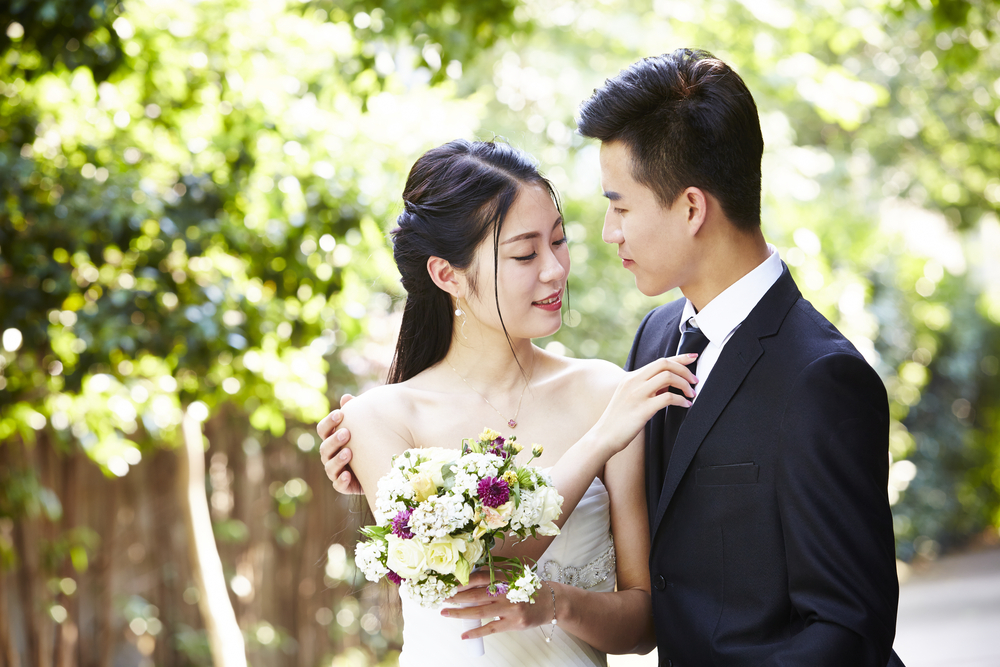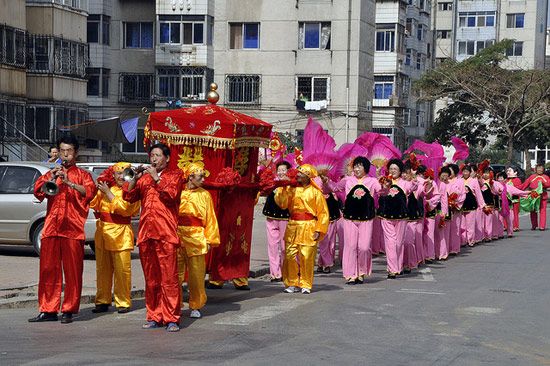Life Stages: Marriage
In present-day communist China, citizens consider marriage a mundane contract involving the couple, witnesses, and government officials, followed by private celebrations with family and friends. The affluent Chinese of Beijing, Shanghai, and Guangzhou increasingly express attraction to lavish Western-style weddings.
Standard Practices
The government-sanctioned age for marriage is 22 for men and 20 for women, and those marrying below that age forfeit certain benefits. The median marriage ages are, however, 28 for women and 30 for men. The law forbids college students to marry until they graduate. An increasing number of men and women in contemporary China marry in their late-20s or early-30s.
Although the bride retains her maiden name after marriage, children receive their father’s surname. Couples in urban areas usually wait several months in order to save enough money for a proper wedding celebration. The weddings in rural areas, if not as lavish as their urban counterparts, remain more elaborate and may last up to two days.
Couples celebrate wedding anniversaries by exchanging gifts and (with or without children) going out to dinner and enjoying themselves, particularly in urban areas. In the rural areas, more subdued celebrations may take place, with the family sharing a specially cooked meal at home.
Traditional Conditions
Chinese culture traditionally viewed marriage as an institution in which children could be nurtured in order to carry on the family lineage. In modern, Communist China, where everything defers, in subservience, to the all-powerful state, citizens view marriages merely as government-sanctioned arrangements for companionship and the raising of a single child.
Parents and in-laws play important roles in the marriages of their children, especially in traditional rural areas. While married couples in the rural areas usually stay with the parents of the groom after marriage, couples mostly set up house by themselves in the economically vibrant urban areas.
Traditionally, Chinese considered extramarital affairs taboo for women and condoned them for men; they even expected men to keep one or more concubines, depending on their financial status. According to surveys, Chinese men and women increasingly espouse tolerant attitudes towards extramarital relations.
Marriage Law
Legally, Chinese men and women have an equal say in marriages. Reality, however, proves very different, and many wives still have to contend with traditional male-dominant attitudes. Traditionally, the culture expected the men to act as primary breadwinners and heads of families, while relegating to women the roles of submissive housewives. The increasing participation of women in the exploding Chinese economy, in addition to their increasing assertiveness, has resulted in growing disharmony and incidence of spousal abuse at home.
During the early Communist days, obtaining a divorce proved very difficult for couples who needed the permission of their work establishments before they could file for a divorce. In the early years of the 21st century, the government significantly liberalized the laws and now divorce by mutual consent can be obtained in 10 minutes at the cost of one dollar. Following this law, more than 1.5 million couples obtained divorces in China, and the trend shows no sign of waning. No legal or cultural obstacles prevent the remarriage of divorcées or widows in China.
The Marriage Law provides freedom to both husband and wife to own assets independently in a marriage. It also includes provisions for protection of the interests of divorced women, and children from divorced marriages. Divorce cannot be filed if the wife is pregnant or nursing a young child. Courts can grant divorce to either parent, and children have the right to choose the parent with whom they want to live.
Copyright © 1993—2025 World Trade Press. All rights reserved.

 China
China 
